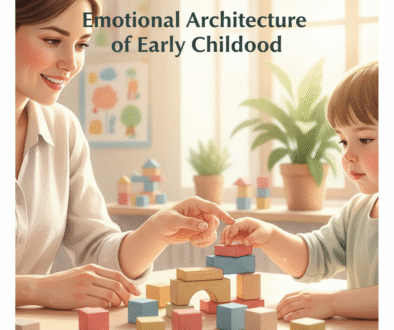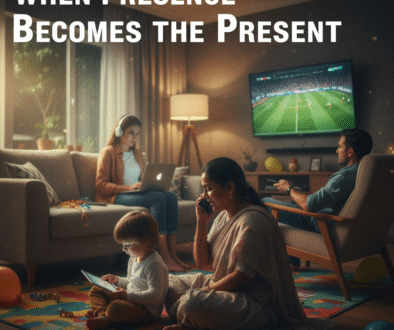The Fear of Saying Sorry
The Power of an Apology: A Teacher’s Reflection
As a teacher and lifelong observer of human behavior (read: professional people-watcher), I’ve come to deeply respect the power of a sincere apology. It’s astonishing how much weight one word can carry. When spoken from the heart, “sorry” can mend relationships, ease emotional burdens, and clear the air faster than an industrial-strength air purifier. Yet, I’ve often wondered why adults—leaders, parents, colleagues—treat it like some kind of forbidden magic spell.
Saying Sorry to Our Own Children
Why is it so hard for some parents to apologize to their children? Somewhere along the way, the belief took hold that saying “sorry” might undermine authority—as if kids would suddenly overthrow the household and demand total reign over bedtime. But in truth, it does the opposite.
When you apologize to your child, you model accountability and empathy. You teach them that making mistakes is human, but owning up to them builds character (and prevents future therapy bills). Pedagogically, this fosters emotional intelligence in children, helping them process and understand emotions—both their own and others’.
As a teacher, I’ve learned that apologizing to students when I’m wrong fosters an atmosphere of mutual respect. Once, during an art activity, I harshly criticized a child for spilling paint. Their face fell, and guilt washed over me like a tidal wave. I knelt down, looked them in the eye, and said, “I’m sorry for the way I spoke to you. It wasn’t fair.”
The child smiled, and we moved on, stronger than before. That small apology taught them that even adults make mistakes—and that it’s okay to own up to them (and that spilled paint is not, in fact, the end of civilization).
The Power of a Supervisor’s Sorry
Hearing an apology from a supervisor is rarer than finding an untouched slice of cake in the staff room, but when it happens, it’s magical. It shows that even those in positions of authority are human and willing to take responsibility. When a leader apologizes, it creates a ripple effect. It builds trust, models humility, and fosters a culture of openness (which, let’s be honest, is preferable to the usual culture of awkward passive-aggressiveness).
I remember a time when my supervisor admitted they had overlooked an important suggestion I made. Their simple, heartfelt apology didn’t just clear the air; it made me feel respected and valued. It reminded me that leadership isn’t about being infallible—it’s about showing integrity.
When leaders apologize, they strengthen the foundation of their team and set an example of accountability. Plus, let’s face it, it makes them approximately 300% more likable.
A Personal Reflection: The Day My Son Called Me Out
On an emotional level, apologizing to your child builds trust. It reassures them that you see them not just as a subordinate, but as a person worthy of respect. And from a human perspective, it’s simply the right thing to do. Why should children feel the sting of your mistakes without the balm of your acknowledgment?
I remember a moment when my son was jumping on the sofa after I had repeatedly asked him to stop. I was irritated that day and snapped, “Stop it! Sit down!” He froze, then turned to me and said, “I can’t run, I can’t watch a story, I can’t play, I can’t jump—so tell me what I can do?!”
That stopped me in my tracks. His words hit me harder than any rebuke ever could. I realized I had let my irritation overshadow his world—a world where energy, curiosity, and joy are the default. I immediately apologized, admitting that I was wrong to snap. We went to the park together, leaving the episode behind.
But for me, it was a turning point. I realized how easy it is for adults to forget the richness of a child’s world—their boundless curiosity, the joy in small things, and their need to feel heard. It reminded me that saying sorry to a child doesn’t make you smaller; it makes you wiser (and slightly less of a hypocrite when you preach about kindness).
The Emotional Weight of Unspoken Apologies
What happens when we don’t apologize? Sometimes, the opportunity slips away forever. Life is fleeting, and time is relentless. The person you owe an apology to might not always be there when you finally muster the courage.
When you withhold an apology, you risk carrying a burden that could have been lifted with a single word. Regret builds a heavy wall, brick by brick, and every missed moment to make things right adds to its height. How much lighter would it feel to simply say, “I’m sorry” and leave space for healing before it’s too late?
What Children Teach Us About Sorry
Children don’t carry the same ego or fear we do. They see mistakes for what they are—opportunities to learn and grow. When we apologize to children, we show them they matter. We teach them that relationships aren’t about power struggles but about connection (which, ideally, involves fewer slammed doors and dramatic eye-rolls).
Teenagers, too, benefit from hearing apologies. These years can be full of tension, as they test boundaries and push back against authority. When a parent says, “I’m sorry for raising my voice. I shouldn’t have spoken to you that way,” it humanizes the parent and opens the door for honest communication. And who knows? They might even grunt a response that sounds vaguely like “It’s okay.”
The Indian “Sorry” Paradox
Living in India, I hear “sorry” thrown around like confetti at a parade. It’s everywhere—but rarely meant. A person cuts you in line? “Oops, sorry.” It’s a hollow reflex, a verbal tic rather than an admission of fault. Someone bumps into you? “Oh sorry, sorry.” A waiter spills your drink? “So sorry, ma’am.”
And yet, when it actually matters, sorry is avoided like it’s a curse. Many Indians, I’ve observed, see apologizing as an admission of weakness. Say sorry, and you’re handing over power—giving others a chance to use it against you. I learned this the hard way when I once apologized for something that could have been handled better. Suddenly, it was all my fault. Others who were equally involved got a free pass, and my apology was treated as a confession of guilt rather than a sign of integrity.
Coming from Poland, where owning up to mistakes is seen as a strength, this blew my mind. To me, admitting an error shows maturity and self-respect. But here, it can be seen as self-diminishing. There’s probably some sociological theory explaining this dynamic, but I’m not about to do a thesis on it. Let’s just say—different cultures, different rules.
A Mistake Is a Misstep, Not the End
At its core, a mistake is just a missed step—a moment where you didn’t act your best. Acknowledging that mistake isn’t about losing; it’s about choosing integrity.
Saying sorry doesn’t just clear the air; it clears your conscience. It’s a simple act, but its impact is profound. For the person receiving it, it’s a reminder that they matter. For the one giving it, it’s a reclaiming of humanity and a chance to move forward with honesty.
So, the next time you hesitate, remember this:
Apologies aren’t signs of weakness; they’re acts of courage. They’re not about losing face; they’re about gaining trust. And sometimes, they’re the only way to make sure you don’t carry the weight of words unspoken for a lifetime.


